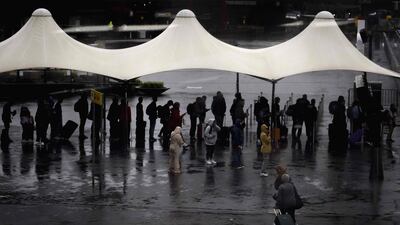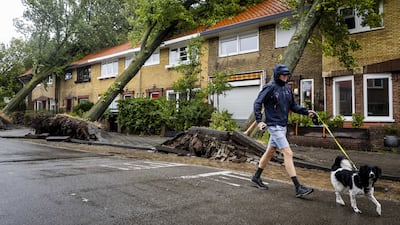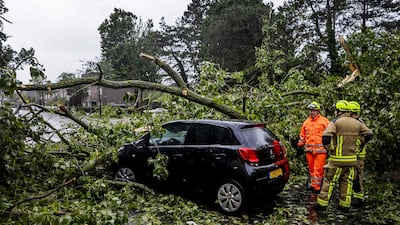Hundreds of flights have been cancelled at Schiphol Airport after the Netherlands' strongest summer storm on record slammed into the Dutch coast.
Authorities urged people to stay indoors as the national meteorology institute issued a red weather warning for a large part of the country after storm Poly made landfall early on Wednesday with winds of up to 146kph.
The high winds, heavy rain and poor visibility led to the cancellation of about 400 flights at Schiphol Airport, one of Europe's busiest.
Airport bosses said there would be "very limited air traffic" for incoming and departing flights until 4pm local time at the earliest.
"At the moment, 400 flights have been cancelled," a Schiphol representative said.
The airport is a major hub for connecting flights from Asia, the Middle East and the US to the rest of Europe.
All trains to Schiphol were halted, causing further disruption for air travellers.
Dutch media showed pictures of uprooted trees and wind-blown debris littering streets in Amsterdam, The Hague and the city of Haarlem as the storm barrelled through during the normally busy morning rush hour.
A woman was killed in Haarlem when a tree fell on a car, police spokeswoman Nina Moers said. In the capital, a tree fell on a houseboat moored in one of the city's historic canals.
Videos showed trees scattered across roads, toppled on a row of houses in Haarlem and uprooted on to a tram in The Hague. Amsterdam municipality closed parks as the storm hit.
Strong winds also hit parts of north-western Germany. Police said a pedestrian died in Rhede, near the Dutch border, after a tree fell on him.
Eurostar trains from Amsterdam to London and high-speed services to the German cities of Cologne and Hamburg were called off, while many domestic train services were cancelled, Dutch train operator NS said.
Residents of the Noord-Holland province, which includes Amsterdam, were sent push alarms on mobile phones warning them to stay indoors.
Winds of force 11, the second highest on the scale, were measured in the northern port of IJmuiden, making it the “first very severe summer storm ever measured” in the country, Dutch weather service Weerplaza said.
A gust of 146kph measured in IJmuiden was the strongest recorded in any summer in the Netherlands and its strongest overall since January 2018, weather agency Weeronline said.
Heavy storms in the Netherlands usually occur between October and April.
Its last heavy summer storm was in 2015, the first in more than a century.
With about a third of the country lying below sea level, the Netherlands is particularly vulnerable to extreme weather and the effects of climate change, and has a huge system of dykes and other water defences.
A violent North Sea storm on the night of January 31 into February 1, 1953, killed 1,836 people.
The storm is expected to blow northwards across the Netherlands later on Wednesday, into Denmark and Germany.









